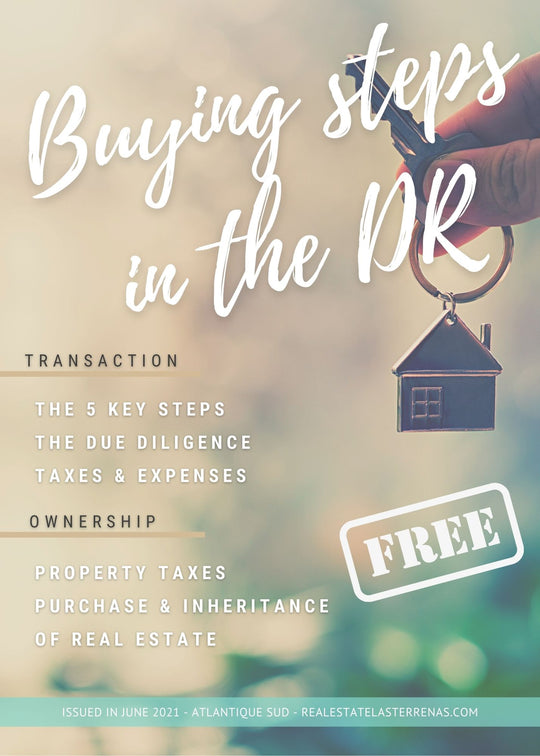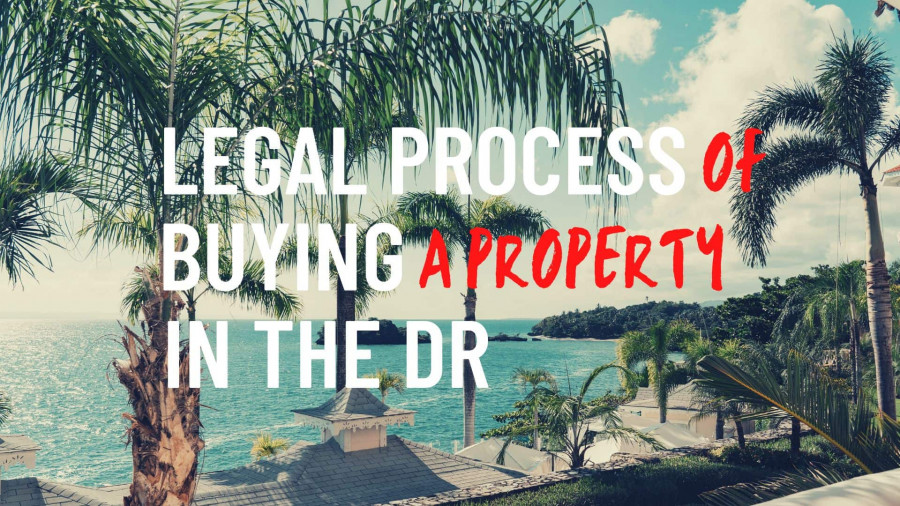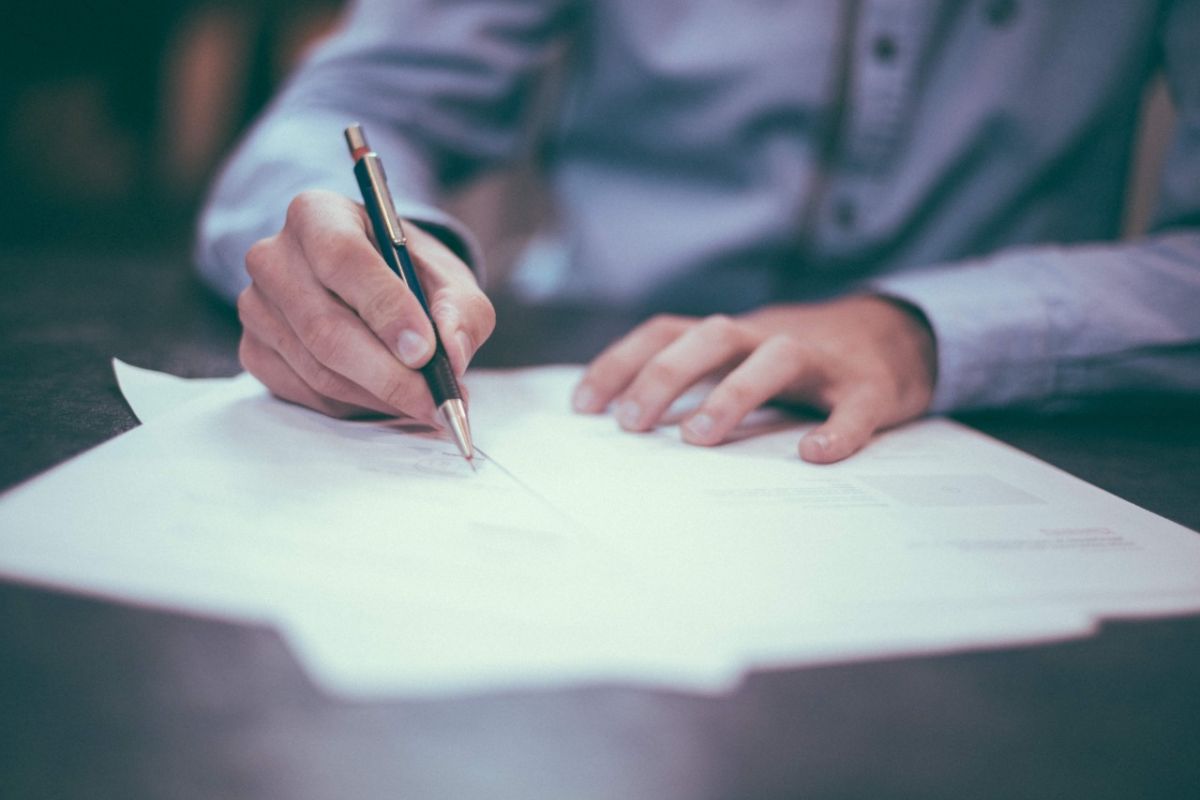What are the main steps of the legal process of buying property in the Dominican Republic?
The legal process of buying property in the Dominican Republic can be a bit complex and time-consuming, but it is important to ensure that the transaction is done legally and correctly. Some of the main steps involved in the process include:
-
-
-
-
-
-
-
-
-
- Download our free Buying Guide here
It's worth noting that the legal process and requirements can vary depending on the specific location and type of property, so it's important to have a good lawyer to guide you through the process and ensure that everything is done legally and correctly.
Here is a more detailed description of each step in the legal process of buying property in the Dominican Republic:
Hire a lawyer
It is important to hire a reputable and experienced lawyer who can guide you through the legal process and ensure that all necessary documents are in order. The lawyer will also be responsible for conducting a title search, checking for any outstanding liens, mortgages, or encumbrances on the property, and verifying that the seller is the legal owner and has the right to sell the property.
Obtain a tax identification number (RNC)
All foreign buyers must obtain an
RNC number from the tax office in order to complete the purchase. This number is required to register the property in your name and to pay the property taxes. Your lawyer can assist you in obtaining the RNC.
This is an important step in the legal process of buying property in the Dominican Republic. RNC is a unique number issued by the tax office that is required for various legal transactions, including buying or selling property and paying taxes.
It is not strictly required to have an RNC (tax identification number) in order to purchase property in the Dominican Republic. However, it is highly recommended to obtain an RNC, as it is required for various legal transactions involving the property, such as registering it in your name, paying property taxes, and opening a bank account.
Having an RNC is mandatory for any legal transaction in the country, and it is required to register the property in your name, pay property taxes, or even open a bank account. It's important to have your lawyer assist you in obtaining the RNC and making sure that it's in good standing.
It's important to keep in mind that the process of obtaining an RNC can take some time, and it's important to have a good lawyer to guide you through the process and ensure that everything is done legally and correctly. It's also important to keep in mind that the RNC is valid for a certain period of time and it's important to renew it before it expires.
Therefore, it is highly recommended to obtain an RNC before buying property in the Dominican Republic, to ensure that you can complete all legal transactions related to the property smoothly and avoid any delays or complications.
Here are the main steps involved in obtaining an RNC:
-
Gather the necessary documents: You will need to gather the necessary documents to obtain an RNC, including your passport or ID, proof of address, and a copy of your purchase agreement.
-
Submit the documents to the tax office: Your lawyer will then submit the documents to the tax office, along with a fee.
-
Verify the information: The tax office will verify the information provided and ensure that the documents are in order.
-
Obtain the RNC: Once the documents have been verified, the tax office will issue the RNC in your name.
The process of obtaining an RNC can take some time, and it's important to have a good lawyer to guide you through the process and ensure that everything is done legally and correctly.
It's also important to keep in mind that the RNC is valid for a certain period of time and it's important to renew it before it expires.
It's important to have your lawyer assist you in obtaining the RNC and making sure that it's in good standing.
Finally, it's worth noting that some properties may have outstanding taxes or liens, and that can make the process of obtaining the RNC more difficult and time-consuming, so it's important to check with your lawyer and consult with the tax office before buying the property.
Research the property
The lawyer will check the property's title, zoning, and any other legal issues that may affect the sale. This includes researching the property's history, checking for any outstanding debts or liens, and ensuring that the property is in compliance with local zoning laws.
Researching property is an important step in the legal process of buying property in the Dominican Republic. This step is typically done by a lawyer who is handling the sale, but can also be done by the buyer.
Here are some of the main things to consider when researching a property:
Title search: The lawyer or buyer will conduct a title search to ensure that the property is not already registered in someone else's name, and that there are no outstanding liens, mortgages, or encumbrances on the property. This search can be done at the Property Registry Office or the National Property Office (ONAT)
Zoning laws: The lawyer or buyer will check that the property is in compliance with local zoning laws. This includes checking if the property is in a residential or commercial zone, if there are any restrictions on the use of the property, and if there are any building codes that need to be met.
Property history: The lawyer or buyer will research the property's history to ensure that there are no outstanding debts or liens on the property. This includes checking if the property taxes are up to date and if there are any pending lawsuits or legal issues that may affect the sale.
Property condition: The lawyer or buyer will check the condition of the property, this includes checking the structure and condition of the building, as well as the state of any appliances or fixtures.
Property boundaries: The lawyer or buyer will verify the property boundaries, this includes checking if the property is properly demarcated, and if there are any disputes or encroachments on the property.
Environmental factors: The lawyer or buyer will check for any environmental hazards or factors that may affect the property, such as flooding or landslide risks.
It's worth noting that this process can take some time and requires a lot of attention to detail.
Sign a purchase agreement
Once all the necessary checks have been made and the purchase price has been agreed upon, the buyer and seller will sign a purchase agreement. This document will outline the terms of the sale, including the purchase price, closing date, and any contingencies.
The process of signing a purchase agreement is an important step in the legal process of buying property in the Dominican Republic. A purchase agreement is a legally binding document that outlines the terms of the sale, including the purchase price, closing date, and any contingencies.
Here are the main steps involved in signing a purchase agreement:
-
Negotiate the terms of the sale: The buyer and seller will negotiate the terms of the sale, including the purchase price, closing date, and any contingencies. A contingency is a condition that must be met before the sale can be completed, for example, the buyer obtaining financing or the property passing a certain inspection.
-
Hire a lawyer: Both parties should hire a lawyer to review and draft the purchase agreement. The lawyer will ensure that the agreement complies with local laws and regulations and that the rights and interests of both parties are protected.
-
Review and sign the purchase agreement: The buyer and seller will review the purchase agreement and sign it. The purchase agreement will typically include details such as the purchase price, the closing date, any contingencies, and the responsibilities of both parties.
-
Make a deposit: The buyer will typically pay a deposit to secure the property and show good faith. This deposit is usually held in escrow until the closing date.
-
Go through with the closing: Once all contingencies have been met and the purchase price has been paid, the closing will take place. This is the point at which the property is transferred from the seller to the buyer, and the ownership of the property is officially transferred.
The lawyer will also assist in ensuring that the purchase agreement is compliant with local laws and regulations and that the rights and interests of both parties are protected.
It's also important to have a clear understanding of the contingencies, so you can be prepared for them and the closing can happen smoothly.
Pay a deposit
The buyer typically pays a deposit to secure the property and show good faith. This deposit is usually held in escrow until the closing date.
Obtain your property title
The lawyer will assist in obtaining a property title, which is the official document that proves ownership of the property. This document will be issued by the National Property Office (ONAT) and will include information about the property, such as its location, size, and legal description.
Obtaining the property title is an important step in the legal process of buying property in the Dominican Republic. It is the official document that proves ownership of the property.
Here are the main steps involved in obtaining a property title:
-
Gather the necessary documents: Your lawyer will need to gather all the necessary documents, including the purchase agreement, proof of payment of any taxes or fees, and the property tax certification.
-
Submit the documents to the corresponding government bodies: Your lawyer will then submit the documents to the different offices, as well as pay some fees.
-
Verify the information: The National Property Office will verify the information provided and ensure that the documents are in order. They will also conduct a search to ensure that the property is not already registered in someone else's name.
-
Obtain the property title: Once the documents have been verified and the search has been completed, the National Property Office will issue the "cédula" or property title in the buyer's name.
-
Register the property: With the property title in hand, the property can be registered at the Property Registry Office as a proof of ownership.
It's also important to note that some properties may not have a clear title, and that can make the process of obtaining a title more difficult and time-consuming, so it's important to check with your lawyer and consult with the National Property Office before buying the property.
In some cases, the seller may not have the property title yet, that could happen if the property has recently been acquired by the seller, or if the property has not been registered yet. In these cases, the process of obtaining property title can be more complex and time-consuming, and it's important to have a good lawyer to guide you through the process and ensure that everything is done legally and correctly.
Pay the remaining balance
Once the "cédula" or property title has been obtained, the buyer will pay the remaining balance of the purchase price. This is usually done through a wire transfer or other means agreed upon by both parties.
Register the property
The property must be registered at the Property Registry Office in order to be legally recognized and protect the rights of the buyer. This is typically done by the lawyer and it will include the payment of a registration fee.
The process of registering a property at the Property Registry Office, also known as the "Registro de la Propiedad", is an important step in the legal process of buying property in the Dominican Republic. This step is usually done by the lawyer who is handling the sale, but can also be done by the buyer.
Here are the main steps involved in registering a property at the Property Registry Office:
Gather the necessary documents: The lawyer or buyer will need to gather all the necessary documents to register the property, including the purchase agreement, the "cédula" or property title, the property tax certification, and proof of payment of any taxes or fees.
Submit the documents to the Property Registry Office: The lawyer or buyer will then submit the documents to the Property Registry Office, along with a registration fee.
Verify the information: The Property Registry Office will verify the information provided and ensure that the documents are in order. They will also conduct a search to ensure that the property is not already registered in someone else's name.
Register the property: Once the documents have been verified and the search has been completed, the Property Registry Office will register the property in the buyer's name.
Obtain the registration certificate: The buyer will then receive a registration certificate, also known as "Certificado de Registro", which serves as proof of ownership of the property.
Also, it's important to note that the property registry office is in charge of maintaining an updated register of the properties and their ownership, it's important to ensure that the property is registered in your name to ensure that you have legal rights over the property.
It's important to have a lawyer to guide you through the process and ensure that everything is done legally and correctly.
Finally, it's worth noting that some properties may not have a clear title, and that can make the process of registering the property more difficult and time-consuming, so it's important to check with your lawyer and consult with the property registry office before buying the property.
Obtain the property tax certification
A property tax certification must be obtained in order to pay the property taxes. This is usually done by the lawyer and includes the payment of an annual property tax.
Also known as "IPI" is an annual property tax that must be paid by the property owner. The certification serves as proof of payment of the property tax and is required for various legal transactions involving the property, such as selling or renting it.
The process of obtaining the property tax certification usually starts by your lawyer obtaining the property's tax assessment from the local tax office. This assessment will include information about the property such as the location, size, and value, as well as the annual property tax amount that must be paid.
Once the assessment has been obtained, the lawyer will calculate the property tax that needs to be paid, taking into consideration any exemptions or reductions that may apply. The payment of the property tax will be done in the local tax office, and the certification is usually issued after the payment has been made.
It's important to note that the property tax rate can vary depending on the location and value of the property, so it's important to check with your lawyer or the local tax office for the exact amount that needs to be paid.
It's also important to be aware that in some cases the property tax certification may not be up to date, and the property may have unpaid taxes. It's important to discuss this with your lawyer, as the unpaid taxes will need to be paid before the property can be registered in your name.
In addition to the property tax certification, there are several other real estate taxes that may apply in the Dominican Republic. These include:
Transfer Tax (Impuesto de Transferencia): This tax is applied to the transfer of ownership of a property and is calculated as a percentage of the purchase price. The rate of the transfer tax can vary depending on the location of the property and whether the buyer is a foreign or local individual.
Capital Gains Tax (Impuesto de Ganancias de Capital): This tax is applied to the capital gain realized from the sale of a property and is calculated as a percentage of the sale price. The rate of capital gains tax can vary depending on the holding period of the property and whether the seller is a foreign or local individual.
Value-Added Tax (IVA): This tax is applied to the sale of new properties and is calculated as a percentage of the purchase price. The current rate is 18% for new properties.
Property Maintenance Tax (Impuesto de Conservación): This is a yearly tax that property owners need to pay, it is based on the property's value, and it is set by the local authorities.
It's worth noting that these taxes and rates may be subject to change and could vary depending on the location of the property and the specific circumstances of the transaction, so it's important to check with a lawyer or tax professional for the most up-to-date information.
It's also important to note that some property taxes, such as the IPI, may be paid by the seller or the buyer depending on the agreement between both parties. It's important to discuss this with your lawyer to understand who is responsible for paying the taxes, and how it will be reflected on the purchase agreement.
Useful links
Here are some websites where you can use to find useful information about the steps of the legal process of buying property in the Dominican Republic:
-
Title search and property history: The Property Registry Office (http://www.registropropiedad.gob.do/) offers access to property title records, online services and information about the property registration process.
-
Zoning laws and building codes: The Ministry of Environment and Natural Resources (https://www.ambiente.gob.do/) offers information about zoning laws, building codes, and environmental regulations.
-
Obtaining a tax identification number (RNC): The Internal Revenue Service (DGII) (https://www.dgii.gov.do/) offers information about the process of obtaining an RNC, including the necessary documents and fees.
-
Researching the property and environmental factors: The National Institute of Hydrology, Meteorology and Environmental Studies (INAMHI) (http://www.inamhi.gob.do/) offers information about environmental hazards, such as flooding or landslide risks, and natural resources in the country.
- Download our free real estate buying guide

Conclusion
Purchasing property in the Dominican Republic can be a complex process, but with the right guidance and support, it can be a smooth and successful experience. By understanding the legal requirements and steps involved, including obtaining a tax identification number, researching the property, signing a purchase agreement, and registering the property at the Property Registry Office, you can ensure that your property purchase is in compliance with local laws and regulations.









